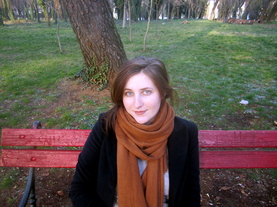
IRIS login | Reed College home Volume 96, No. 2: June 2017
Reedie Wins Gates Scholarship
Elizabeth Honor Wilder '11 has won a prestigious Gates Cambridge Scholarship, recognizing exceptional academic achievement and the capacity for leadership.
The award will allow Elizabeth to spend a year at Cambridge pursuing Victorian ideas about wardship, education, the family, and the individual.
The scholarship was funded by the Bill and Melinda Gates Foundation, which donated $210 million to the University of Cambridge, the largest single donation to a UK university. The selection of scholars and scholars in residence is managed by the Gates Cambridge Trust, which began awarding scholarships in 2001. Since then, there have been 1,086 Gates Scholars from 94 countries. Of the 90 scholarships awarded each year, 40 are given to U.S. citizens.
Elizabeth has been teaching English conversation and writing on a Fulbright grant at two campuses in the public university system of the University of Montenegro in Niksic and Berane. She also team-teaches at Mediterranean University, a private university in the capital city of Podgorica.
Classes in Berane meet in an abandoned museum and there are shortages of everything from chairs to chalk. But her students meet the circumstances with grace and humor, sparking a feeling of collaboration.
While teaching descriptive writing, Elizabeth brought in a Shakespeare sonnet to illustrate irony, metaphor and simile. Throughout the lesson there was the usual smattering of whispers and side conversations in the class of almost 50 students. When they were finished analyzing the poem, Elizabeth played a recording of British actor Alan Rickman reading it.
"I can picture the scene very clearly," Elizabeth says, "the late autumn sun coming into the classroom through an open window, Rickman's voice filling up the whole room, and my students, all of them incredibly, unbelievably silent and still. When the recording had ended, there was a long pause and then they all exhaled in unison. It was a simple moment, but very lovely, I think. My students experienced the beauty of the poem and, even more important, recognized their own ability to encounter, in a powerful and meaningful way, literature in another language. And I felt that, for a brief time, the usual chaos of the day had faded around us and we were brought together on the same page."
Elizabeth also coordinates education and outreach programs at the American Corner Podgorica, a community space co-funded by the American Embassy and the City of Podgorica that provides books, computers, lectures, presentations and workshops for Montenegrins and expatriates. She has organized a film series that depicts Americans and their narratives in ways not usual in mainstream media. Recent screenings have included "Winter's Bone" and "Killer of Sheep."
At Cambridge, Elizabeth will continue to focus on a topic that informed her thesis at Reed, which was entitled "Untying the guardian knot: wardship in the Victorian imagination.
The premise of her thesis was that Victorians were actively engaged in negotiating the role of the legal system in constructing and legislating family structures, much as we do today in debates over adoption, in vitro fertilization, and same-sex marriage. Over the course of the 19th century, wardship (the site of many of these negotiations) emerged in literary and cultural texts as the nexus of a number of new ideas about gender, imperialism, and the meaning of the individual.
"I am especially interested in the ways Victorian novels transform legal identities into plot structures," she says. "At Cambridge I'll be focusing on what might be called the 'pedagogical wardship plot,' or the story of a ward's education, in order to inquire into the multiple meanings of maturity, and its legal analogue, majority."
At Cambridge she will be working under the supervision of a professor who specializes in the intersections of law and literature during the Victorian period. Cambridge's extensive archives house a great deal of unpublished material, which will also be a boon to her research.
Elizabeth credits her education at Reed, which encouraged intellectual passion and independent work, for preparing her for this next step. She admires her former professors as scholars and people and suggests it's really the questions a teacher asks that matter the most.
"Christine McBride [English & Humanities 2008-] asked the most difficult questions," Elizabeth remembers. "I often wrote them in my notebooks so I could think about them later. Christine is a role model for me."
She looked forward to her weekly meetings with thesis advisor Jay Dickson [English 1996-] who challenged her to be clear and comprehensive in her argument as she wrote responsibly and critically.
"What I loved was the interplay among classes, bringing something I had read for Nigel Nicholson's [classics 1995-] class to Christine's conference and then revisiting the same idea, deepened by its multiple contexts, in a paper for Jay," Elizabeth says. "I loved being able to make those connections, to begin to build a body of knowledge from the overlapping edges of all those courses."
Elizabeth plans to pursue a career in academia, publishing and international education.
Tags: alumni, awards, brilliant students, English major



LATEST COMMENTS
steve-jobs-1976 I knew Steve Jobs when he was on the second floor of Quincy. (Fall...
Utnapishtim - 2 weeks ago
Prof. Mason Drukman [political science 1964–70] This is gold, pure gold. God bless, Prof. Drukman.
puredog - 1 month ago
virginia-davis-1965 Such a good friend & compatriot in the day of Satyricon...
czarchasm - 4 months ago
John Peara Baba 1990 John died of a broken heart from losing his mom and then his...
kodachrome - 7 months ago
Carol Sawyer 1962 Who wrote this obit? I'm writing something about Carol Sawyer...
MsLaurie Pepper - 8 months ago
William W. Wissman MAT 1969 ...and THREE sisters. Sabra, the oldest, Mary, the middle, and...
riclf - 10 months ago